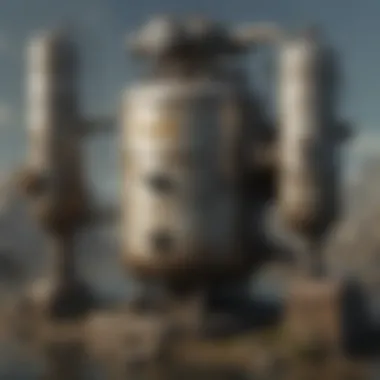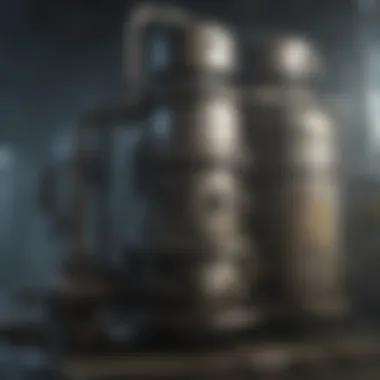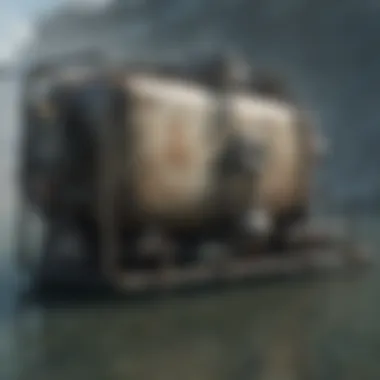Unveiling the Intricacies of Industrial Water Purifier Machines: An In-Depth Exploration


Lore Insights
In the realm of industrial water purifier machines, delving into the lore of innovative purification technology unveils a world of cutting-edge advancements. Understanding the pivotal mechanisms behind these machines is akin to deciphering the intricate plot of a complex narrative. Each component plays a crucial role, much like the historical events shaping the Fallout universe. From the inception of water purification to the evolution of sophisticated filtration systems, every detail contributes to a comprehensive understanding of industrial water purification.
Exploring the key historical events in the development of industrial water purifier machines mirrors the unfolding saga of a riveting tale. Just as pivotal moments in Fallout lore set the stage for various factions and characters, the evolution of water purification devices has transitioned from rudimentary filters to state-of-the-art purifiers. Unraveling these events sheds light on the impact of technological advancements on industrial water quality, akin to the historical shifts within the Fallout timeline.
A deep dive into the backstory of major factions and characters in the context of industrial water purifier machines reveals intricate connections akin to the alliances and rivalries within the Fallout universe. Analyzing the prominent technologies and industry players is akin to deciphering the motives and allegiances of factions and characters in Fallout. Understanding the complex web of relationships between different purification methods and suppliers adds a layer of depth to the narrative of water quality enhancement across industries.
Inventory Insights
- Types of Industrial Water Purifier Machines
- Advantages and Limitations
- Application in Various Sectors
Immersion into the inventory insights of industrial water purifier machines unveils a plethora of purification options, each with its own unique attributes and benefits. From reverse osmosis systems to UV disinfection units, the diversity in purifier types mirrors the array of weaponry and armor available in Fallout games. Navigating through the advantages and limitations of each machine requires strategic decision-making, resonating with the player's choice of weapons and gear in the post-apocalyptic world.
Exploring the application of industrial water purifier machines across various sectors draws parallels to the strategic resource management required in Fallout gameplay. Just as players must optimize resource utilization to survive, industries must efficiently deploy water purification systems to thrive. Understanding the significance of these machines in sectors such as agriculture, pharmaceuticals, and manufacturing highlights their indispensable role in enhancing water quality and sustainability.
Unraveling the intricate connections between industrial water purifier machines and their applications provides a holistic view of the vital role they play in ensuring clean and safe water sources. Much like navigating the treacherous wastelands of the Fallout universe with carefully chosen weapons and armor, industries must select the most suitable purification methods to combat contaminants and maintain environmental equilibrium.
Synthesis of Insights
In the tapestry of industrial water purifier machines, synthesizing the information presented throughout reveals a comprehensive narrative of technological evolution and environmental impact. From delving into the historical roots of water purification to exploring the application of advanced systems across industries, every piece harmoniously fits into a coherent storyline. Just as the resolution of key plot points in Fallout culminates in a satisfying conclusion, the synthesis of insights on industrial water purifiers culminates in a profound understanding of their significance in ensuring water quality and sustainability.
Crafting a seamless narrative that intertwines technological expertise, environmental stewardship, and industrial applicability sets the stage for a compelling exploration of industrial water purification. By synthesizing the intricacies of purification methods, benefits, and applications, this comprehensive guide offers readers a roadmap to navigate the intricate landscape of clean water solutions. The fusion of historical context, practical insights, and future implications creates a rich tapestry that underscores the critical role of industrial water purifier machines in safeguarding water resources for generations to come.
Prolusion to Industrial Water Purifier Machines
Industrial water purifier machines play a pivotal role in ensuring the quality of water used in various industries. These sophisticated systems are designed to eliminate contaminants and impurities, safeguarding critical processes and end products. By understanding the technology behind these machines and their impact on water quality, industries can optimize their operations and enhance overall efficiency.
Understanding the Need for Industrial Water Purification
Challenges in Industrial Water Contamination
Industrial water contamination poses significant challenges to various sectors, including manufacturing, pharmaceuticals, and food processing. The presence of pollutants, chemicals, and microorganisms can jeopardize production processes and lead to serious health hazards. Implementing effective water purification measures is crucial to mitigate these risks and maintain regulatory compliance.
- Impact of Impurities on Industrial Processes
Impurities in water can have detrimental effects on industrial processes, reducing efficiency and product quality. Scaling, corrosion, and microbial growth are common issues that can disrupt operations and increase maintenance costs. Addressing these impurities through advanced purification technologies is essential for sustaining production standards and ensuring consistent output quality.
Overview of Industrial Water Purification Technology
Reverse Osmosis Systems
Reverse osmosis systems utilize semi-permeable membranes to remove impurities from water through a high-pressure filtration process. This technique is highly effective in eliminating dissolved solids, contaminants, and bacteria, producing clean and purified water for industrial applications. However, the system's efficiency may vary based on feedwater quality and operational parameters.


- Ultrafiltration Techniques
Ultrafiltration techniques involve the use of membrane filters to separate particles, colloids, and microbes from water. This method offers enhanced removal capabilities compared to traditional filtration processes, ensuring superior water quality for diverse industrial needs. Despite its effectiveness, proper maintenance and monitoring are essential to optimize performance and prolong membrane lifespan.
- Ion Exchange Processes
Ion exchange processes involve the exchange of ions between a resin medium and water to remove specific impurities such as heavy metals and hardness ions. This technology is ideal for treating water with targeted contaminants, providing tailored purification solutions for industrial settings. However, the regeneration and disposal of spent resins pose environmental challenges that require careful consideration.
Importance of Water Quality in Industries
Enhancing Process Efficiency
Maintaining high water quality is instrumental in enhancing process efficiency and productivity in industrial facilities. Clean and pure water ensures consistent equipment performance, minimizes downtime, and prolongs operational lifespans. By investing in reliable purification systems, companies can optimize resource utilization and achieve cost-effective manufacturing processes.
- Ensuring Product Quality
Water quality directly impacts product quality in industries such as food and beverage, pharmaceuticals, and cosmetics. Contaminated water can compromise the taste, safety, and stability of end products, adversely affecting consumer perception and regulatory compliance. Implementing stringent water quality standards through advanced purification technologies is crucial for upholding product integrity and brand reputation.
Types of Industrial Water Purifier Machines
In the realm of industrial water purification, understanding the different types of water purifier machines is paramount. This section delves deep into the categorization of these machines to provide a comprehensive overview. Various elements such as filtration mechanisms, purification techniques, and application-specific features distinguish each type. By exploring the nuances of point-of-use and centralized water purification systems, readers can grasp the importance of selecting the right equipment for specific industrial requirements.
Point-of-Use Water Purifiers
Point-of-use water purifiers play a crucial role in ensuring water quality at the source. Among the notable technologies employed in these systems are Activated Carbon Filters and Ultraviolet (UV) Disinfection Systems. The utilization of these technologies highlights the significance of addressing contaminants and pathogens at the point of consumption for enhanced water safety.
Activated Carbon Filters
Activated Carbon Filters excel in removing impurities through the process of adsorption. This unique filtration mechanism traps contaminants within the carbon pores, effectively improving water clarity and taste. Their versatility and ability to target a wide range of pollutants make them a popular choice for industries seeking reliable water treatment solutions. Despite their effectiveness, Activated Carbon Filters may require frequent replacement to maintain optimal performance.
Ultraviolet (UV) Disinfection Systems
Ultraviolet (UV) Disinfection Systems utilize ultraviolet light to deactivate bacteria and viruses present in water. The key characteristic of UV systems lies in their ability to disrupt microbial DNA, rendering harmful microorganisms inactive. This technology offers a chemical-free and environmentally friendly approach to water disinfection, appealing to industries looking for sustainable purification methods. However, UV Disinfection Systems are reliant on consistent power supply and may not remove certain types of contaminants effectively.
Centralized Water Purification Systems
Centralized water purification systems operate on a larger scale to cater to the extensive water treatment needs of industries. Multi-Stage Filtration Units and Electrodeionization (EDI) Systems represent two pivotal technologies in this category. These systems are designed to handle significant water volumes while maintaining high purification standards for various industrial processes.
Multi-Stage Filtration Units
Multi-Stage Filtration Units utilize a sequence of filtration stages to target different contaminants present in water. The key characteristic of this approach is its thorough purification process, ensuring comprehensive removal of impurities. Employing multiple filtration techniques enhances water quality by addressing diverse sources of contamination. However, the complexity of Multi-Stage Filtration Units may require specialized maintenance and operational expertise.
Electrodeionization (EDI) Systems


Electrodeionization (EDI) Systems employ electrically charge membranes to remove ions from water, producing ultra-pure water for critical industrial applications. The key feature of this technology is its continuous regeneration capability, allowing for ongoing water purification without the need for chemical regeneration agents. EDI Systems are favored for their efficiency in producing high-quality water, making them a valuable asset in industries where water purity is of utmost importance. Despite their advantages, EDI Systems may involve higher initial investment costs.
Factors to Consider When Choosing an Industrial Water Purifier Machine
In the realm of industrial water purification, selecting the right water purifier machine is a critical decision that can significantly impact the overall efficiency and quality of operations. When embarking on this decision-making process, there are several essential factors that must be carefully considered to ensure optimal performance and cost-effectiveness. From analyzing water quality requirements to evaluating capacity and flow rates, each aspect plays a pivotal role in determining the most suitable industrial water purifier machine for specific needs and applications.
Water Quality Requirements
Analyzing Contaminant Levels
When delving into the realm of water quality requirements for industrial applications, analyzing contaminant levels stands out as a fundamental step in ensuring the effectiveness of the purification process. By scrutinizing the composition of impurities present in the water source, industrial facilities can tailor their treatment approaches to target and eliminate specific contaminants effectively. This meticulous analysis not only enhances the overall water quality but also mitigates the risk of process disruptions and equipment damage caused by contaminants. Although the process requires detailed examination and specialized expertise, the benefits of precise contaminant analysis are invaluable in optimizing industrial water purification systems for peak performance.
Identifying Specific Treatment Needs
In the spectrum of water quality requirements, identifying specific treatment needs emerges as a crucial element in designing an efficient and targeted purification strategy. By pinpointing the unique challenges and characteristics of the water source, industrial operators can customize their treatment processes to address specific contaminants and quality concerns effectively. This tailored approach not only enhances the efficacy of the purification system but also minimizes resource wastage and operational costs by focusing on the essential treatment requirements. Despite the complexity involved in identifying specific treatment needs, the strategic advantages it offers in optimizing water purification systems justify the meticulous attention to detail and planning required in this critical aspect.
Capacity and Flow Rate
Matching System Capacity to Demand
In the landscape of industrial water purification, matching system capacity to demand emerges as a pivotal consideration in ensuring seamless and uninterrupted operations. By aligning the purification system's capacity with the facility's water usage patterns and peak demand periods, industrial facilities can avoid bottlenecks, downtime, and inefficiencies in their water treatment processes. This strategic alignment not only optimizes resource utilization but also enhances operational reliability and productivity by providing the required water volume precisely when needed. Despite the computational complexity involved in determining the optimal system capacity, the benefits of matching capacity to demand are instrumental in guaranteeing consistent and reliable water purification performance.
Considering Peak Usage Scenarios
Within the realm of capacity and flow rate considerations, evaluating peak usage scenarios stands out as a critical aspect in designing a robust and resilient water purification system. By anticipating and planning for peak demand periods, industrial facilities can equip their purification systems to handle maximum water flow rates without compromising efficiency or quality. This proactive approach not only safeguards against capacity overloads and system failures during peak operation times but also ensures that the purification process remains stable and effective under varying operational conditions. Despite the foresight and planning required to address peak usage scenarios, the advantages of optimizing system performance for high-demand situations justify the strategic preparations and investments in this integral aspect.
Maintenance and Lifecycle Costs
Scheduled Maintenance Procedures
In the domain of industrial water purification, scheduled maintenance procedures play a paramount role in sustaining the long-term performance and durability of purification systems. By implementing regular maintenance schedules and protocols, industrial facilities can prevent equipment malfunction, deterioration, and extended downtime, ensuring continuous and reliable water treatment operations. This proactive approach not only extends the operational lifespan of purification systems but also minimizes repair costs and operational disruptions by addressing potential issues before they escalate. Despite the commitment and resources required for implementing scheduled maintenance procedures, the benefits of ensuring system reliability and efficiency justify the conscientious investment in preventive maintenance practices.
Long-Term Operational Expenses
Within the spectrum of maintenance and lifecycle costs, analyzing long-term operational expenses emerges as a critical consideration in evaluating the overall cost-effectiveness and sustainability of industrial water purification systems. By estimating and budgeting for ongoing operational costs, such as energy consumption, consumables, and labor, industrial facilities can optimize their financial planning and resource allocation for water treatment activities. This foresighted financial analysis not only enables businesses to predict and control their expenditure on water purification but also facilitates strategic decision-making regarding system upgrades, optimizations, and expansions. Despite the meticulous financial planning and monitoring involved in managing long-term operational expenses, the advantages of optimizing cost efficiency and profitability in industrial water purification operations necessitate the thorough evaluation and scrutiny of ongoing expenditure.
Applications of Industrial Water Purifier Machines
Industrial water purifier machines play a critical role in various sectors, ensuring optimal water quality for diverse applications. In this article, we delve into the significance of these machines, highlighting their specific elements, benefits, and considerations. From the food and beverage industry to pharmaceutical manufacturing and power generation plants, the applications of industrial water purifier machines are vast and essential for maintaining operational excellence.
Food and Beverage Industry
Ensuring Product Safety:


One pivotal aspect of industrial water purifier machines in the food and beverage industry is their role in ensuring product safety. The stringent measures imposed by regulatory bodies necessitate high standards of water quality to prevent contamination and uphold the integrity of consumables. By implementing water purification systems like reverse osmosis and ultraviolet disinfection, companies can safeguard their products against harmful impurities, microorganisms, and pollutants. The process of ensuring product safety through advanced purification technologies is paramount for meeting industry regulations and consumer expectations.
Maintaining Flavor Profiles:
Another key function of industrial water purifier machines in the food and beverage sector is maintaining flavor profiles. Water quality directly impacts the taste and consistency of beverages and food products. By utilizing purification techniques tailored to preserve flavor nuances, such as activated carbon filtration, companies can uphold the distinct characteristics of their offerings. This specialized approach not only enhances consumer satisfaction but also contributes to brand loyalty and competitive advantage. While maintaining flavor profiles can be resource-intensive, the long-term benefits in quality assurance and customer retention justify the investment.
Pharmaceutical Manufacturing
Meeting Regulatory Standards:
In pharmaceutical manufacturing, meeting stringent regulatory standards is imperative to ensure product efficacy and safety. Industrial water purifier machines play a pivotal role in complying with these exacting requirements by providing ultra-pure water for critical processes like drug formulation and equipment sterilization. The adherence to regulatory guidelines through water purification technologies like ion exchange and ultrafiltration showcases a commitment to product quality and regulatory compliance. By investing in systems that prioritize meeting regulatory standards, pharmaceutical companies can mitigate risks of contamination and maintain operational excellence.
Controlling Microbial Contamination:
Controlling microbial contamination is a crucial aspect of pharmaceutical manufacturing, where even minor deviations can compromise product integrity. Industrial water purifier machines equipped with microbial control features, such as membrane filtration and disinfection processes, offer a robust defense against microbial threats. By implementing comprehensive strategies for microbial contamination control, pharmaceutical facilities can ensure the sterility of their products and production environments. The advantage of stringent microbial control lies in preventing costly product recalls and preserving the reputation of pharmaceutical brands, underscoring the importance of proactive contamination prevention.
Power Generation Plants
Protecting Equipment from Scaling:
Power generation plants face challenges related to scale formation in equipment due to water impurities. Industrial water purifier machines contribute significantly to protecting equipment from scaling by eliminating mineral deposits and corrosive agents through advanced purification mechanisms. By integrating technologies like electrodeionization and multi-stage filtration, power plants can extend the lifespan of critical components and enhance operational efficiency. The protection of equipment from scaling not only reduces maintenance costs but also minimizes downtime, ensuring continuous power generation for sustained operations.
Improving Boiler Efficiency:
An essential objective in power generation plants is enhancing boiler efficiency to optimize energy output. Industrial water purifier machines play a key role in this goal by maintaining water quality parameters that promote efficient heat transfer and prevent boiler scaling. The use of purification systems such as reverse osmosis and smart monitoring tools enables plants to improve boiler efficiency, reduce fuel consumption, and lower carbon emissions. The unique advantage of enhancing boiler efficiency through water purification solutions lies in achieving sustainable energy production and operational cost savings, underscoring the critical importance of maximizing plant performance.
Future Trends in Industrial Water Purification
Understanding the evolving landscape of industrial water purification is crucial in today's dynamic environment. Future trends in this sector pave the way for innovative solutions to address emerging challenges. It is imperative to delve into the developments shaping the future of water purification technology to stay ahead in this fast-paced industry. By exploring future trends, industry professionals can anticipate changes, adapt strategies, and enhance efficiency and sustainability.
Innovations in Water Treatment Technologies
Nanotechnology Applications
Nanotechnology applications revolutionize water treatment by offering precise and efficient methods for contaminant removal. The key characteristic of nanotechnology lies in its nano-sized materials, enabling enhanced filtration and purification processes. Nanotechnology's utility in water purification is notable for its unparalleled efficiency in removing even the tiniest impurities, ensuring cleaner water outputs. Despite its advantages, the use of nanotechnology may pose challenges in large-scale implementation due to cost considerations and potential environmental impacts.
Smart Monitoring Systems
Smart monitoring systems are integral to optimizing water purification processes through real-time data collection and analysis. The standout feature of smart monitoring systems is their ability to provide actionable insights for system performance improvements. Their adoption in industrial settings is beneficial for ensuring optimal operation, early detection of issues, and predictive maintenance. However, balancing the benefits of smart monitoring with potential cybersecurity risks is a critical aspect to consider for safeguarding sensitive data and infrastructure.
Sustainability Initiatives in Water Management
Water Reuse and Recycling Programs
Water reuse and recycling programs play a pivotal role in promoting sustainable water management practices. The key characteristic of these initiatives is their emphasis on conserving and maximizing the use of water resources through efficient recycling techniques. Water reuse programs offer a cost-effective solution for industries to reduce water consumption and minimize environmental impact. Despite their advantages, challenges in public acceptance and infrastructure requirements may hinder widespread adoption of water reuse and recycling programs.
Energy-Efficient Purification Solutions
Energy-efficient purification solutions are at the forefront of sustainable water management strategies, focusing on minimizing energy consumption without compromising purification quality. The key characteristic of these solutions lies in their ability to optimize energy usage throughout the water treatment process. Energy-efficient systems offer long-term cost savings and environmental benefits by reducing carbon footprints. However, the initial investment costs and specialized maintenance considerations are factors that businesses must evaluate when implementing energy-efficient purification solutions.







